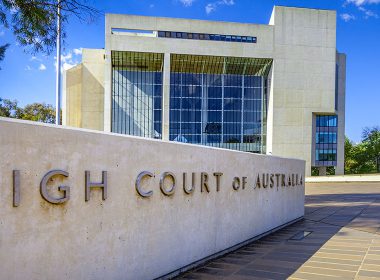Polls for upcoming elections all over the democratic world show a concerning rise of far-right, populist parties that support xenophobic and anti-democratic rulings. Does the mainstream media have a responsibility in this change, and can it be a threat to Australia and other world democracies?
On March 11 2024, the small country of Portugal, nestled on the western edge of Europe, woke up to a startling reality. The year they celebrate 50 years since the end of the fascist dictatorship that ruled the country with an iron fist for over four decades and 49 MPs from the far-right party Chega were elected to parliament, up from 12 only two years before.
It was a shocking moment of self-reflection. Chega’s leader, André Ventura, ran on a platform of populism, anti-establishment, anti-immigration and ultra-conservative values. Their members openly admire the fascist dictatorship and are proud of the country’s bloody colonial past. One million voters had succumbed to the far-right in a country of just over 10 million people.
Only five months before, Javier Milei was elected President of Argentina. The populist libertarian promised to axe most public services, including health and education, to fix Argentina’s severe and long-standing economic woes.
The results in Argentina and Portugal aren’t surprising. They mirror a tendency in Western audiences for anti-establishment, populist parties that often steer into anti-immigration and anti-gay-rights platforms. But in a year with so many vital elections happening, including the US presidential election, is the rise of far-right parties a concern to democratic values, and what does it mean one year from the next Australian Federal election?
The threat in the old continent
There are about two dozen elections in Europe this year, including legislative elections in key European countries like Austria and Belgium, important regional elections in Germany and Spain, and a continent-wide election for the European Parliament.
After joining the European Union, Austria was the first European country to form a government with a far-right party. In 1999, the FPÖ (Freedom Party of Austria) was part of the coalition government with the Christian Democrat and Liberal Conservative ÖVP. It spearheaded a series of sanctions from other members of the Union.
In the last elections, the party got 16 per cent of the vote, electing just 31 MPs, but the latest polls show the populist party leading at around 30 per cent. The country is increasingly displeased with the current government and the opposition on the left struggles to connect with the electorate.
In the meantime, FPÖ named their leader, Herbert Kickl, the next “Volkskanzler” (Chancellor of the people, a term popularised by the German Nazi Party to describe Adolf Hitler). Kickl criticised the government for the answer to COVID-19, continued attacking immigration and the European Union, and stood against funding Ukraine in the war against Russia.
Belgium is also a critical case. The small country in central Europe dubbed the capital of Europe, is also seeing a resurgent of its far-right party. Vlaams Belang is a Flemish-Independentist, far-right, anti-immigration, and anti-European party whose support in the Flanders region is growing. The party is polling first in most samples but still needs a majority.
Germany won’t have federal elections this year, but it is holding regional elections that can shape the future of the political landscape. Three key states are changing governments – Saxony, Thuringia and Brandenburg – and the far-right party AfD (Alternative for Germany) is currently leading the polls.
The prospect of the far-right forming a government in three crucial states raised the alarms in the country, leading to a series of protests against the rise of the party. Earlier in February, 200,000 people marched all over the country, but a weakened economy and strong immigration are also galvanising the parties that label themselves anti-system and pro-nationalist.
Perhaps the most critical litmus test for the European Union is the elections to the European Parliament this coming June. The legislative body of the Union is often a neglected election, so it provides a chance for small fringe parties to incite their target audience to come to the polls. It is the body to which Nigel Farage was elected from 1999 to 2014, then as leader of the UKIP party.
Each country elects a number of MPs, depending on the size of the population – Germany, for example, elects 96, France 79, Italy 76, but the small country of Malta only 6.
Each elected party sits according to their political leanings, divided into parliamentary groups of similar ideals. In that case, the European People’s Party (EPP) comprises all parties in the Christian Democracy and Liberal Conservative tag, while the Progressive Alliance of Socialists and Democrats (S&D) includes all Social Democrats and Progressive parties.
Identity and Democracy (ID) is the group that comprises all far-right, Eurosceptic, populist parties. It has 59 MPs, including members from the German AfD, Italy’s Lega, Belgian Vlaams Belang, and Austria’s FPÖ. A recent Politico poll forecasts ID may elect almost 100 MEPs and emerge as the third-largest group in parliament. It raises more concerns post-Brexit since all the parties involved advocate for their country to leave the Union.
Trump v Biden in the post-truth era
The 2016 US Presidential election was the first one where the spectre and influence of social media revealed itself as a critical factor in the political discourse.
At the time, the New York Times revealed Trump had received almost two billion US dollars worth of free media. The CEO of CBS, Les Moonves, admitted in February 2016, months before the election, that Donald Trump’s candidacy was economically sound for the network.
In the last The Economist poll, Biden remained ahead of Donald Trump by only one per cent. It is a short lead, especially considering the campaign has not officially started. Unless there’s a catastrophe, the controversial ex-president will be the Presidential candidate for the Republican Party after the withdrawal of frontrunners Ron DeSantis and Nikki Haley.
A showdown between Biden and Trump is now inevitable, and it is prompting concern about social media disinformation and how it can skew the election.
Donald Trump knew how to use social media for his benefit. In the 2016 and the 2020 elections, Trump was notorious for provocative tweets that often contradicted his speeches. After January 6, 2021, when a group of Trump supporters invaded the American Senate, supposedly stoked by Trump’s own words, the Social Media platform banned the ex-president. In the aftermath, Trump created his social media platform – Truth Social – where he continues to post his opinions. Elon Musk famously purchased Twitter for USD 44 billion, and he proceeded to change the platform name to X and tried to lure Trump back into it, which he rejected.
“It’s the Trump playbook. You make controversial statements that are shocking, and people report on that as something that is newsworthy.”
Mathieu O’Neil, Researcher and Professor at the University of Canberra
Media almost feels compelled to cover Donald Trump, a lesson that many European leaders learned after 2016.
In 2019, British columnist Owen Jones accused mainstream media of having a major role in the rise of the far-right. “Too many [journalists] working in the British press act as hatemongers who play with matches then express horror as the flames reach ever higher, while broadcasters such as the BBC have given airtime to far-right thugs such as Tommy Robinson,” he concludes in his article. “With the far right globally in the ascendancy – from Italy to Brazil – the role of the media must be urgently debated. Mainstream media outlets and politicians are directly assisting the rise of the far right.”
But for Mathieu O’Neil, social media is still the most concerning threat. He notes that after the pandemic, trust rose when people were looking for reliable information, but the general trend is that the level of trust is falling.
“It’s the Trump playbook,” says O’Neil, researcher and Professor at the University of Canberra. “You make controversial statements which are shocking, and so people report on that as something that is newsworthy and gets you more airtime than anyone else because others are trying to stick to the normal playbook and be moderate – conventional, boring, institutional speak of politicians.”
O’Neil notes that it’s difficult to beat Trump at his own game. If he attacks with a crazy statement, by the time the opponent tries to refute it, he has already made even crazier statements.
“The only way to deal with someone like that is to ignore them and stick to your core message”, O’Neil continues.
“People are disappointed with globalisation. They were promised economic benefits that didn’t happen”.
This discontent leads to scapegoating, blaming others for all our woes. And as that discontent grows, social media becomes the ground to pass information or misinformation that exploits that narrative. Echo chambers in Facebook or WhatsApp groups share information, sometimes from dubious sources.
“US-based social media platforms have been cowed into submission by the fear that if they correct misinformation from right-wing sources, they will be accused of bias, and that is very effective in restricting their ability to moderate misinformation”, continues O’Neil.
Is this a concern to Australia? O’Neil gives the example of the Voice referendum where misinformation was unchallenged by the mainstream media, but he also notes Australia has something those countries don’t – compulsory voting. “Because you have to appeal to everybody, you can’t do what the US does, where you have these incredibly gerrymandered electorates, and you can win with 20 per cent of the votes”, O’Neil says. “In Australia, there is that moderating influence”.
O’Neil does believe that the threat to democracy remains. Information is abundant and easily accessible to everyone, and there are very few tools to determine what is true and what is not. How we access information determines what is true, and platforms curate the information and keep it personalised for each user. O’Neil believes those who oppose democracy are trying to undermine this even more.
“Nowadays, there are people in America or Italy who think Putin is doing the right thing, and they’re in this environment where nothing contradicts their view,” he concludes.
As a way to combat misinformation, O’Neil is a big supporter of Wikipedia. He considers the free-content online encyclopedia an inclusive resource that can help fight misinformation.
If a person finds information in a library or reads peer-reviewed journals, they are not worried if a statement is false. But on social media, it is not as easy. “In that case, you should not engage deeply – read laterally,” he explains. “Look away, don’t go deep, don’t go vertical and open another tab to search”. Wikipedia articles, O’Neil says, are reliable – they warn the reader if the article has unconfirmed statements, all changes are logged and transparent, and every note is verified with links to the resources.
In the fight against misinformation, our attentiveness can make a difference for O’Neil. “Discriminate how you deal with information based on the kind of environment that you’re in.”




